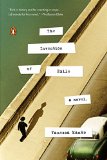Summary | Excerpt | Reading Guide | Reviews | Beyond the Book | Readalikes | Genres & Themes | Author Bio

A Novel
by Vanessa MankoCONNECTICUT
1913–1920
He arrived in the United States in 1913 on a boat named Trieste. His face open, the brow smooth, eyes with the at once earnest, at once insecure gaze of hopeful, wanting youth. He began work fast. First at the Remington Arms Company, making ammunition for the Russian Imperial Army, rising up the ranks to become an inspector of the Mosin-Nagant rifle and later working for the Hitchcock Gas Engine Company. In Bridgeport, Connecticut. His early mornings spent among the others. The hordes of men shuttling to and from factories in lines and masses of gray or black through the dim light of winter mornings and in the spring when the morning sun was like a secret, coy and sparkling, the water flashing on the sound.
They found each other though. Through all of that, they, the Russians, found each other. They learned to spot each other through mannerisms, glances. This was later. In 1919. Then, the restrictions came at work and in the boardinghouse.
"English! You must speak English! That, or go back home," the foreman always said.
The warehouses loomed up around the men like capes. Their windowpanes caked with dirt, small rectangles of frosted, beveled glass. Sometimes, the broken panes were replaced by colored lozenges—sea green, slate blue, dark ruby red. Austin liked to connect them, making up constellations, innumerable designs and geometries.
"English!" The foreman's voice would resound off the tin walls, echoing off the glass, the workers all seated in rows solemn and silent, some standing. Once he made the mistake of speaking Russian to a worker.
"Bolshevik! Go back to Russia and bring your revolution with you!" the foreman yelled.
In those early years he sometimes spoke Russian in his sleep and woke in a sweat, the others around him, snoring or stirring as he peeled back his covers to step out of bed, springs creaking.
"The bastard is up again."
"Hey, Polak—can't you sleep like a normal person?" The inaccuracy, or the intent, of the slander—he was not sure which had been the more injurious. Cautiously, he'd slip out of the room and with overcoat on, make his way through the narrow hallways and down to the first floor, feeling for the latch underneath the stairs—its wrought iron handle cool and coarse. He'd made a deal with the proprietor. For one more dollar a month he agreed to keep Austin's books safe—notebooks mostly. The owner wouldn't touch them, he'd promised. And in the milky white of those winter mornings, Austin would sit at the large kitchen table working. His drafting paper spread across the table. A compass. A slide rule. Then he was obsessed with the scientist Faraday, examining his notebooks, reading his reports on electromagnetic wave theory for radio. He was fascinated with Maxwell's question: What is light? He'd read Maxwell's Matter and Motion, Theory of Heat.
. . .
Near the Remington Arms, mostly, and sometimes too along the streets leading to the Hitchcock Gas Company, men lay in wait to descend upon the workers, thrusting flyers, notices, newspapers into reluctant hands, running alongside them, sometimes for up to two blocks. They were a nuisance, but Austin never refused. He took what was presented and stuffed these pamphlets and papers into the deep pockets of his overcoat. At the end of a week's time, his pockets had no room for his gloves. On Sunday mornings, early, he removed each piece of paper, unfolding, smoothing out the crumpled notices. He read them, some in Russian, others in broken English. Lecture on the History of Russian Folk; Advance in Soviet Machines; Russian Choral Recital; Speak, Read, Write: English; History of Man. Other postings and announcements filled the boardinghouse's entrance hallway. Newsprint paper tacked to the walls in a confusing jumble resembling papier-mâché. Someone had secured a row of nails for such flyers and the papers hung off the walls folded inward as if fatigued, corners rustling when the door opened to a February, March, or June gust, causing the inevitable swirl of errant flyers. There were papers on the floor, strewn along the stairs, curled and shivering in the doorway, some escaping out to the street and away. Other flyers hung from strings draped off nails, dangling mobile-like and beckoning with more elegance than their unlucky pinioned neighbors.
From The Invention of Exile by Vanessa Manko. Reprinted by arrangement with The Penguin Press, a member of Penguin Group (USA) LLC, A Penguin Random House Company. Copyright © Vanessa Manko, 2014.
Your guide toexceptional books
BookBrowse seeks out and recommends the best in contemporary fiction and nonfiction—books that not only engage and entertain but also deepen our understanding of ourselves and the world around us.